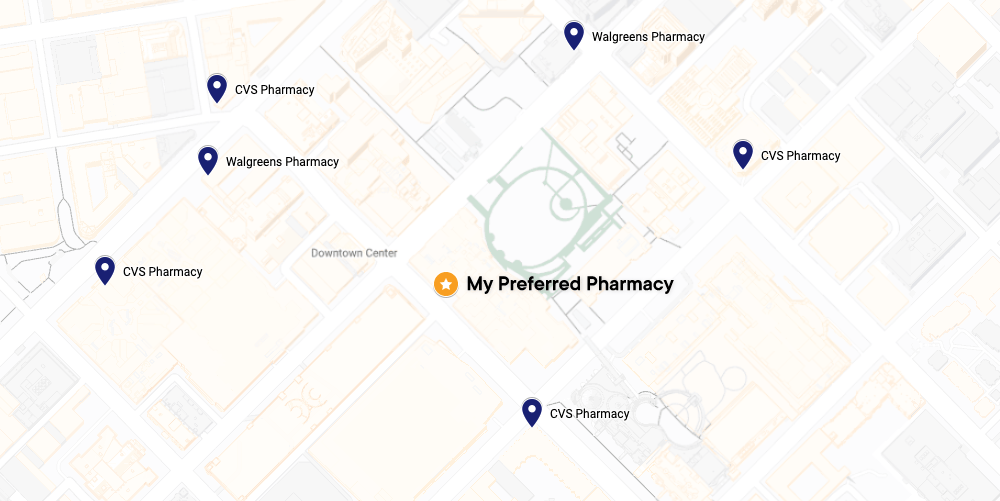
Hormone replacement therapy (HRT) online
If you are experiencing menopause hot flash symptoms that don't respond to other treatments, hormone replacement therapy (HRT) could be an option. HRT can also be helpful in preventing osteoporosis. Hormone treatments mitigate hormone changes and alleviate symptoms like hot flashes, night sweats, vaginal dryness and can also improve sleep, mood, and sexual drive.1

The benefits of hormone replacement therapy for menopause symptoms
Hormone replacement therapy (HRT) is a treatment that can help relieve the vasomotor symptoms of menopause, such as hot flashes and night sweats. These symptoms are caused by a decrease in estrogen and progesterone levels during menopause, and they can affect your quality of life, sleep, mood, and energy. HRT can restore the hormonal balance and reduce the severity and frequency of these symptoms.
HRT is not suitable for everyone, and it may have some side effects and risks, depending on your medical history, the type and dose of hormones, and the duration of use. Some of the potential risks include an increased chance of blood clots, stroke, heart disease, and breast cancer. Therefore, it is important to talk to your doctor about your symptoms, your options, and your preferences before starting HRT. You should also have regular check-ups and screenings while on HRT and use the lowest effective dose for the shortest possible time.
If you are interested in HRT, you can book a consultation with one of our board-certified online doctors to discuss your symptoms and if HRT can help. Please note that due to the potential risk of breast cancer, your physician may request a copy of a mammogram within the past year or that you complete a mammogram prior to starting HRT for menopause symptoms.
Types of hormone replacement therapy
Hormone replacement therapy (HRT) can be classified into three main types, depending on the ingredients, the source, the FDA approval status, and the suitability for different patients. These are:
- Bioidentical hormone replacement therapy (BHRT)
- Estrogen/progesterone replacement therapy
- Estrogen replacement therapy
The following table summarizes the main differences between the three types of HRT:
|
Name of treatment |
Bioidentical hormone replacement therapy (BHRT) |
Estrogen/progesterone replacement therapy |
Estrogen replacement therapy |
|
Main ingredients |
Compounded versions may contain estrogen, progesterone, and testosterone |
Contains estrogen with progestin (progestogen) Contains estrogen with progestin (progestogen) |
Contains estrogen only |
|
What it does |
Traditionally, BHRT refers to hormones with the same molecular structure as those made by the body. Nowadays, this term is often used for compounded hormone regimens |
Increases the naturally occurring chemicals in your body |
Increases the naturally occurring chemicals in your body |
|
How it’s made |
Varies depending on the compounding pharmacy |
Made from animal hormones |
Conjugated estrogens made from animal hormones |
|
Who it’s for |
For women who still have their uterus |
For women who still have their uterus |
For women who have had a hysterectomy |
|
FDA approved? |
Compounded BHRT is not FDA approved or recommended |
FDA approved |
FDA approved |
|
Associated cancer risks |
Estrogen taken alone in patients with a uterus can increase the risk of developing endometrial cancer. However, this risk is decreased when taking estrogen + progesterone formulations |
Progestin can prevent the occurrence of endometrial cancer |
Estrogen taken alone in patients with a uterus can increase the risk of developing endometrial cancer. However, this risk is decreased when taking estrogen + progesterone formulations. |
HRT and osteoporosis
Besides menopause, hormone replacement therapy can also help prevent osteoporosis. This bone disease develops when bone mineral density and bone mass decreases, or when the structure and strength of bone changes.6 Osteoporosis is the major cause of fractures in postmenopausal women but can affect anyone.
Aside from HRT, there are other things you can do to minimize your risk, including:
- Staying physically active
- Avoiding tobacco and alcohol
- Eating a diet high in calcium and vitamin D
Talk to your doctor about if HRT can help minimize your risk of osteoporosis, especially if you have a family history of the disease. It is important to know that HRT is not considered a first line option for the prevention of osteoporosis.
Side effects
There are some risks associated with hormone replacement therapy, as well as various side effects. Potential side effects and risks can include:
- Increased risks of blood clots, stroke, heart disease, and other adverse effects
- Cardiovascular risk
- Breast tenderness
- Breakthrough bleeding
- Potential risk for certain cancers
Before starting HRT, talk to your online doctor about the risks associated with treatment to help in determining if this treatment is right for you. If during treatment you experience any unwanted symptoms, consult your doctor.
Who should not take HRT?
Hormone replacement therapy may not be suitable for everyone and will affect everyone differently. You should not start HRT if you:
- Have a history of breast cancer
- May be pregnant
- Have problems with vaginal bleeding such as heavy bleeding
- Have a liver disease or bleeding disorder
- Are allergic to hormone medicine
Be sure to discuss your medical history and disclose your current medications and allergies to your doctor before taking hormone replacement therapy.
Alternatives to hormone replacement therapy
If you are looking for menopause symptom relief but HRT may not be the choice for you, don’t worry! There are plenty of alternatives that you can try to help alleviate your symptoms. These can include:
- Mind and body practices such as meditation and low-impact exercise
- Natural products, such as soy and black cohosh
- Non-hormonal medications such as Paroxetine (specifically to treat hot flashes)9
Discuss your menopause symptoms with your doctor, and they will help you determine what treatment is right for you and your body.
Dosage
There are many choices when it comes to which format of HRT is right for you. HRT comes in many forms including pills, skin patches, vaginal creams, gels, rings, and different doses. Treatment also requires regular monitoring, and follow-up appointments allow dosage adjustments based on your response to HRT.
Always consult your doctor before making any dosage changes to ensure their safety and effectiveness.
HRT Cost
The cost of hormone replacement therapy varies by type and dosage. Most insurance will cover or help with the cost of these treatments, and Medicaid will typically cover these treatments for menopause.
Treatment prices are typically as follows:
- A monthly prescription of pills may cost anywhere between $130-$240 per month, but many insurance companies will cover some, if not all, of the cost, leaving patients with a copay of $30 on average.
- * Please note that we do not offer injection or pellet hormonal therapy at PlushCare.
10 questions about hormone treatments to ask your doctor
When discussing hormone therapy with your doctor, it’s important to have all the information before beginning treatment. Here are some examples of questions you may want to ask your doctor about HRT:
1. What are the three stages of menopause?
- Perimenopause: The transition phase between when your symptoms started, and one year after your last menstrual period.
- Menopause: The main stage when symptoms begin and last for a few years.
- Post menopause: The last stage when symptoms of menopause fade.
2. Are there different ways to take hormones?
Replacement hormones can be taken in two main ways: systemic products and localized products. Systemic products come in forms such as tablets and patches, localized products include creams or vaginal rings.
3. What dosage should I start with?
Typically, your doctor will begin with the lowest dose possible, but this varies with the individual.
4. When should I stop taking hormones?
It is usually recommended to consider tapering off hormone replacement therapy for menopausal symptoms around 5 years. Every patient is different though and the treatment duration varies from patient to patient.
5. What studies are available on HRT?
The most famous study was conducted by the Women’s Health Initiative and found that many women can benefit from hormone therapy for the treatment of menopausal symptoms, but it is not recommended for use as the primary risk reduction for chronic conditions such as osteoporosis, heart disease, stroke.1
6. What are the main factors to consider when starting HRT?
Factors to consider include your family history of breast cancer, the severity of your symptoms, and if you have had a hysterectomy
7. Have other patients been satisfied with HRT?
Many women find that the benefits of HRT outweigh the risks, but this is a decision that should be made on an individual basis with you and your doctor
8. Will menopausal symptoms return when I stop HRT?
For some, symptoms can be lifelong, but symptoms commonly taper off in a few months to a year after ending hormone treatment.
9. How else can I ease my menopausal symptoms?
If HRT does not sound right for you, there are other options to help manage symptoms such as hot flashes, insomnia, and vaginal dryness. These include:
- Dressing in breathable clothing with layers
- Using cotton sheets and keeping a regular sleep schedule
- Limiting caffeine and alcohol intake
- Light, regular exercise such as yoga
10. Are there other things I can do to protect myself against osteoporosis?
Hormone treatment should not be given just to prevent osteoporosis, so getting regular exercise and having a diet high in calcium and vitamin D can help strengthen your bones. There are also alternative medicines you can take to help with this.
HRT FAQs
Does hormone replacement therapy delay menopause?
Does hormone replacement therapy cause weight gain?
Does hormone replacement therapy cause cancer?
There are some studies that show that there may be an increased risk for breast cancer with hormone replacement therapy. Therefore, it is imperative to have routine breast cancer screening while on hormone replacement therapy.
For patients with a uterus, there is an increased risk for endometrial cancer if they take estrogen only hormone replacement therapy. Because of this, it is recommended to take combined estrogen and progesterone hormone replacement therapy for patients with a uterus.
How long do you take hormone replacement therapy?
Does it help with weight loss?
How to get hormone replacement therapy online
At Plushcare, receiving HRT treatment for your menopausal symptoms is straightforward:

Book a hormone replacement therapy appointment.

Talk to your doctor about your menopause symptoms. *

Pick up your prescription.
We can send prescriptions to any local pharmacy. Prescriptions are provided at the doctor's discretion.
*Please note that due to the potential risk of breast cancer, your physician may request a copy of a mammogram within the past year or that you complete a mammogram prior to starting hormone replacement therapy for menopause symptoms.
Online appointment pricing details
30 days of free membership
- Same-day appointments 7 days a week
- Unlimited messages with your Care Team
- Prescription discount card to save up to 80%
- Exclusive discounts on lab tests
- Free memberships for your family
- Cancel anytime
Paying with insurance
Membership
$19.99 /month
First month free
Visits
Copay
Visit price with insurance
Often the same as an office visit. Most patients with in-network insurance pay $30 or less!
We accept these insurance plans and many more:



Paying without insurance
Membership
$19.99 /month
First month free
Visits
$129
Visit price without insurance
Sources:
PlushCare is dedicated to providing you with accurate and trustworthy health information.
- National Institute of Arthritis and Musculoskeletal and Skin Diseases “Osteoporosis” Accessed on April 17, 2024, at https://www.niams.nih.gov/health-topics/osteoporosis#:~:text=Osteoporosis%20is%20a%20bone%20disease,of%20fractures%20(broken%20bones)
- North American Menopause Society “Hormone Therapy: Benefits & Risks” Accessed on April 17, 2024, at https://www.menopause.org/for-women/menopauseflashes/menopause-symptoms-and-treatments/hormone-therapy-benefits-risks
- National Library of Medicine “The bioidentical hormone debate” Accessed on April 17, 2024, at https://pubmed.ncbi.nlm.nih.gov/19179815/
- DifferenceBetween.net “Difference Between ERT and HRT” Accessed on April 17, 2024, at http://www.differencebetween.net/science/health/difference-between-ert-and-hrt/
- National Library of Medicine “COMBINED ESTROGEN–PROGESTOGEN MENOPAUSAL THERAPY” Accessed on April 17, 2024 at https://www.ncbi.nlm.nih.gov/books/NBK304338/#:~:text=Combined%20estrogen%E2%80%93progestogen%20menopausal%20therapy%20involves%20the%20co%2Dadministration%20of,associated%20risk%20of%20endometrial%20cancer
- Medical News Today “What to know about hormone replacement therapy for males” Accessed on April 17, 2024, at https://www.medicalnewstoday.com/articles/hrt-for-men#:~:text=HRT%20for%20males%20is%20a,aging%2C%20trauma%2C%20and%20infections
- Harvard Health Publishing “Non-Hormonal Treatments for Menopause” Accessed on April 17, 2024 at https://www.health.harvard.edu/womens-health/nonhormonal-treatments-for-menopause
- The Menopause Center “How Much Does Hormone Replacement Therapy Cost?” Accessed on April 17, 2024, at https://www.tysonsgynecology.com/how-much-does-hormone-replacement-therapy-cost/#:~:text=Injectable%20hormone%20replacement%20therapy%20costs,4%2C800%20for%20an%20uninsured%20person
- American Cancer Society “Menopausal Hormone Therapy and Cancer Risk” Accessed on April 17, 2024, at https://www.tysonsgynecology.com/how-much-does-hormone-replacement-therapy-cost/#:~:text=Injectable%20hormone%20replacement%20therapy%20costs,4%2C800%20for%20an%20uninsured%20person
- National Library of Medicine “Beneficial effect of hormone replacement therapy on weight loss in obese menopausal women” Accessed on April 17, 2024, at https://pubmed.ncbi.nlm.nih.gov/10515671/
- The North American Menopause Society “The Truth About Bioidentical Hormone Therapy” Accessed on April 17, 2024, at https://www.menopause.org/docs/professional/tfpbio_0812.pdf
- Breast Cancer.org “Using HRT (Hormone Replacement Therapy)” Accessed on April 17, 2024, at https://www.breastcancer.org/risk/risk-factors/using-hormone-replacement-therapy
PlushCare content is reviewed by MDs, PhDs, NPs, nutritionists, and other healthcare professionals. Learn more about our editorial standards and meet the medical team. The PlushCare site or any linked materials are not intended and should not be construed as medical advice, nor is the information a substitute for professional medical expertise or treatment.